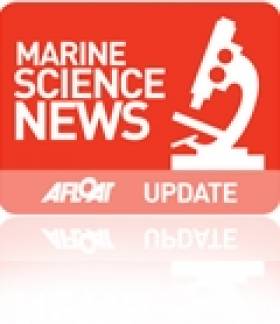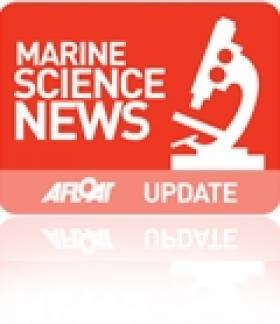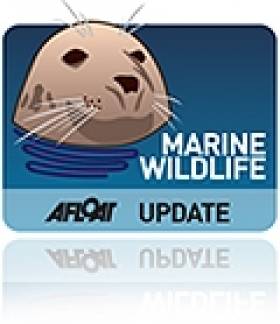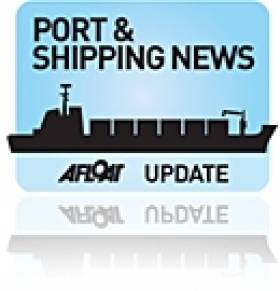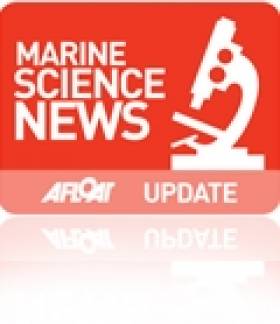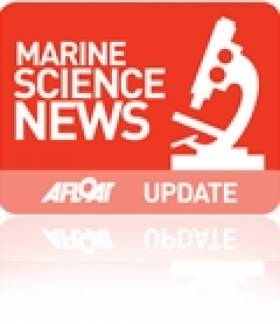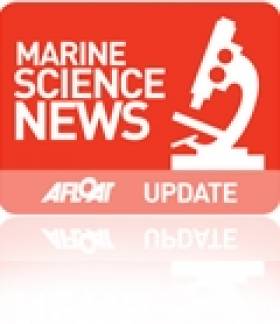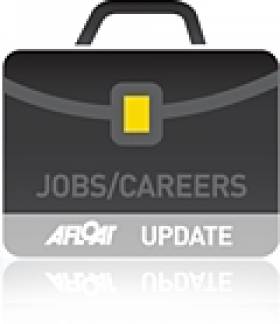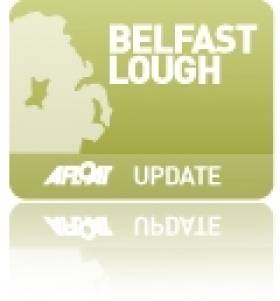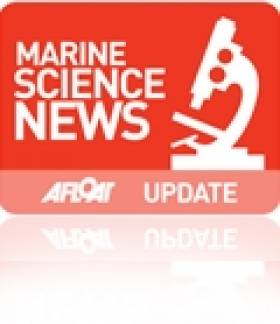Displaying items by tag: Marine Institute
Galway Showcases Marine Science on 'Sea2Sky' Research Night
#marinescience – Galway will celebrate European Researchers' Night on Friday 28th September together with 320 cities around Europe. The Sea2Sky event organised by NUI Galway in collaboration with the Marine Institute, Galway Atlantaquaria and its new partner CIT Blackrock Castle Observatory in Cork, will showcase science on the grandest of scales themed around marine science, atmospherics and astronomy.
The main events will be held at the Galway Bay Hotel, Leisureland and Galway Atlantaquaria, with events also taking place in CIT Blackrock Castle Observatory in Cork. Máire Geoghegan-Quinn, European Commissioner for Research, Innovation and Science, will officially open the Irish segment of European Researchers Night at 3pm to coincide with events starting right across Europe.
A variety of interactive stands at Galway Bay Hotel will highlight the work of the Marine Institute showing how Ireland's has a rich and diverse marine ecosystem.
"The Sea2Sky event provides a great opportunity for the wider community to engage with scientists and researchers at a local level in Galway and learn about Ireland's marine resource which is ten times the size of its land mass," said Dr Peter Heffernan, CEO of the Marine Institute.
"As a key step in developing our marine sectors including marine technology, seafood, marine biodiscovery, as well as marine tourism, shipping and oil & gas, it is important at events such as this to help encourage the young people of Galway to consider careers in marine research and science now and in the future," he said.
Celebrating marine science and research the Marine Institute will greet visitors with some of Ireland's most impressive marine science, technology and equipment:
The Marine Institute will be showcasing:
The ROV Holland 1 and a Weather Buoy, which will be on display at the entrance to the main exhibit centre at Galway Bay Hotel. Scientists and technicians will be there to explain the work of the equipment and recent expeditions.
Inside the exhibit area, Marine Institute scientists will be exhibiting their work relating to:
Marine Environment: The phytoplankton team will be highlighting what life is in the drop of seawater - promoting the Marine Institute's responsibility in monitoring algal blooms and highlighting their work in the national shellfish food safety programmes. Visitors to the event will get the opportunity to see take the living "invisible" phytoplankton from a rock pool and look at it under a microscope.
Weather Monitoring and Oceanography: Scientists will show a variety of technology used for providing vital data for weather forecasts, shipping bulletins, gale and swell warnings – some of which have recorded Ireland's largest waves at sea.
Advanced Mapping & the Real Map of Ireland: The advanced mapping team will be show casing INFOMAR and seabed mapping and the extent of Ireland's 220 million acre marine resource along with learning about shipwrecks in the deep sea.
Research Vessel's Operations: The RVops team will be displaying the work of the national research vessels RV Celtic Explorer and the RV Celtic Voyager, as well as the remotely operated vehicle ROV Holland 1 and the special equipment used in different expeditions.
VENTuRE scientific expedition / Biodiscovery and Ecosystem Survey of the Whittard Canyons: A short film will be running throughout the day at the Marine Institute stand, showing the newly discovered and previously uncharted field of hydrothermal vents along the Mid-Atlantic Ridge taken by the ROV Holland 1 last year. Amazing footage of the cold water corals and life under the sea at depths of 3000m taken during the Biodiscovery and Ecosystem Survey of the Whittard Canyons will also be shown.
Explorers Education Programme: The Explorers education officer and her team from Galway Atlantaquaria will also be providing demonstrations to children and school teachers highlighting how the seashore is a vital teaching resource and Through experiments and a variety of demonstrations children will be able to look at life in a rock pool in the Explorers display tank - the Nobby boat.
"Irish researchers are involved in some huge European research projects, and this is an opportunity to share some of the most exciting elements with the public. At third-level, we have seen a surge in applications for science related courses and this event will be a real draw for anyone tempted by a career in science and research," said NUI Galway's Dr Andy Shearer, lecturer in physics and organiser of the event.
Last year, some 10,000 people came to the event, and the plan is for an even bigger event this year, with highlights including the CERN exhibit, 3D tours of the universe and tours of the aquarium. This year visitors can participate in experiments, competitions and quizzes, watch demonstrations and simulations, exchange ideas and get to know the researchers at the free family fun event.
This year, Sea2Sky is linking up with the Galway Science Forum's exhibition about the work of CERN – Accelerating Science. This exhibition, sponsored by Boston Scientific in partnership with NUI Galway, will show how CERN's Large Hadron Collider can help us understand fundamental questions about the origins of the universe.
For further details of the event visit www.sea2sky.ie.
Galway's Sea2Sky Celebrates European Researcher’s Night in Ireland
#MARINE SCIENCE - Galway will celebrate European Researchers’ Night on Friday 28 September together with 320 cities around Europe with its latest Sea2Sky event.
Sea2Sky, organised by NUI Galway in collaboration with the Marine Institute, Galway Atlantaquaria and its new partner CIT Blackrock Castle Observatory in Cork, will showcase science on the grandest of scales themed around marine science, atmospherics and astronomy.
The main events will be held at the Galway Bay Hotel, Leisureland and Galway Atlantaquaria, with events also taking place in CIT Blackrock Castle Observatory in Cork.
“Irish researchers are involved in some huge European research projects, and this is an opportunity to share some of the most exciting elements with the public," said event organiser and NUI Galway physics lecturer Dr Andy Shearer.
"At third level, we have seen a surge in applications for science related courses and this event will be a real draw for anyone tempted by a career in science and research.”
Last year some 10,000 people came to the event, and the plan is for an even bigger event this year, with highlights including the CERN exhibit, 3D tours of the universe and tours of the aquarium. This year visitors can participate in experiments, competitions and quizzes, watch demonstrations and simulations, exchange ideas and get to know the researchers on the free family day.
Among the showcase exhibits at the Marine Institute will be the ROV Holland 1 and a weather buoy. Scientists and technicians will be on hand to explain the work of their equipment and recent expeditions.
Inside, Marine Institute scientists will exhibit work relating to the marine environment (such as algal blooms), weather monitoring and oceanography, advanced mapping techniqyes, research vessel operations conducted by the R/V Celtic Voyager and R/V Celtic Explorer, and the Explorers Education Programme, which highlights the seashore as a vital teaching resource.
There will also be screenings throughout the day of a short film showing the newly discovered and previously uncharted field of hydrothermal vents along the Mid-Atlantic Ridge captured by Holland 1 last year.
Footage of the cold water corals and life under the sea at depths of 3,000 metres taken during the Biodiscovery and Ecosystem Survey of the Whittard Canyons will also be shown.
This year, Sea2Sky is linking up with the Galway Science Forum’s exhibition about the work of CERN – Accelerating Science. This exhibition, sponsored by Boston Scientific in partnership with NUI Galway, will show how CERN’s Large Hadron Collider can help us understand fundamental questions about the origins of the universe.
For further details of the event, visit www.sea2sky.ie.
Algal Bloom Killing Fish, Shellfish Off West Coast
#MARINE WILDLIFE - An algal bloom off the west coast of Ireland is responsible for significant fish and shellfish kills from Galway to Donegal, according to the Marine Institute.
As The Irish Times reports, as much as 80% of stocks have been affected on Donegal oyster farms, and the bloom is also impacting negatively on angling tourism in the west and northwest.
The algae responsible, karenia mikimotai, occurs naturally in Ireland's coastal waters during the summer months and his harmless to humans, but contains a "toxic irritant" that damages the gills of fish, shellfish and other marine species.
Low-level samples were first detected in May but in the last two weeks it has grown into a dense bloom from Donegal to Mayo, with high levels now being recorded in Galway Bay, according to the Marine Institute's Joe Silke.
"In Donegal the bloom was so dense that there were many reports of discoloured red or brown water in some areas and several areas have reported dead marine life washing up on the shoreline, requiring local authorities to close certain beaches,” he said.
"The bloom affects species that live on or near the sea bed so we are seeing flatfish, lugworms and some shellfish getting washed up on the beaches."
The image evokes memories of the notorious 'red tide' that killed wild fish and shellfish along the west coast in 2005.
Meanwhile, the Marine Insitute said there are "some indications" that the bloom may be moving back out to sea, as observed in the latest satellite images and modelling data.
"However, cell counts of samples analysed in the Marine Institute... show that the bloom is still of the same density in the Donegal and Sligo regions as it was last week."
Ports & Shipping Review: Champagne Voyage, Cruiseship Safety, Scienceship, Ferry Sold, P&O 175th,Belfast Boost
#PORTS & SHIPPING REVIEW - Over the last fortnight Jehan Ashmore has reported from the shipping scene which saw the second WFSV Gardian 10 make a delivery 'Champagne 'promo-voyage to her UK East coast based owners.
Following the Costa Concordia incident, tighter inspections of vessels visiting our ports will be carried out according to the Marine Survey Office.
With all things scientific with the ESOF conference in Dublin, as part of Dublin City of Science 2012, there is still time to apply for the Marine Institute's training position for their research vessel operations.
The last ever passenger (incl. car-ferry) built by Harland & Wolff in 1981, the St. David for Sealink/British Rail departed on her long delivery voyage for new Indonesian owners. For most of her career she served as the Stena Caledonia on the North Channel routes until her recent sale and renaming to Portlink.
P&O Cruises Arcadia sailed into Dublin Bay following a spectacular gathering of her fleetmates in Solent waters to celebrate the 175th anniversary of the world famous shipping company. P&O can trace their origins with an Irish connection as the Dublin and London Steam Packet Co. chartered their paddle-steamer William Fawcett, the vessel being regarded as the first ship working for P&O.
Belfast Harbour revealed record traffic levels for the year 2010-2011 as outlined at the company's annual report. The port showed a 2% rise in profit before taxation to £17.8m and a 4% increase in turnover to £36.1m.
Also in the northern port, the new iconic waterfront landmark of the Belfast Titanic visitor attraction is a key contributory factor in drawing the cruiseship sector. A total of 41 cruise callers are scheduled in 2012 which is an increase to last year's 32 ships.
Research Vessels Call to Dublin Bay Ports
#SCIENCE SHIPS – It is a rare to have both Marine Institute research vessels calling at the same time to east-coast ports, as normally these Galway-based ships managed by P&O Maritime Services, work off the rest of the Irish coast, writes Jehan Ashmore.
As previously reported on Aflaot.ie, the RV Celtic Explorer docked in Dublin Port earlier this week. The 65.5m long vessel currently remains moored alongside Sir John Rogersons Quay (berth 6) as the 10-day Euroscience Open Forum 2012 (ESOF) concludes tomorrow in the Convention Centre. High-level delegates from the international scientific community have made the short crossing over the Liffey's Samuel Beckett Bridge to be welcomed on board.
Across Dublin Bay the RV Celtic Voyager had called to Dun Laoghaire Harbour yesterday, where she stayed overnight for a mid-scientific cruise break, while berthed at St. Michaels Wharf. The 31.4m vessel this morning resumed her scheduled Infomar 2 hydrographic work in the Irish Sea.
#blueecomony – Scientists from both sides of the Atlantic met today at the ESOF 2012 Atlantic Symposium to explore the many ocean governance, economic development and environmental challenges and opportunities their shared Atlantic resource represents.
A key focus of the Symposium is how to harness evolving technology to drive the 'blue economy' through smart, sustainable and inclusive growth and how to achieve this through collaboration across the Atlantic Ocean in the areas of science, technology and innovation.
Speaking at the Atlantic Symposium, Dr. Peter Heffernan, CEO Marine Institute said, "The Atlantic represents a significant resource, and while it separates the continents, it also presents a huge opportunity to work together to solve shared environmental issues and to explore opportunities for development and economic benefit. Today, we have taken the first steps in creating a new roadmap for better and more focussed cooperation between the European and American continents."
Prof Scott Glenn, Rutgers University, USA, described the historical, cultural and scientific links between Europe and the United States of America divided by the expanse of the Atlantic Ocean. He pointed to challenges such as sustainable ocean governance, climate change prediction and impact, and deep-sea research which require a united approach.
These issues were further developed by Prof Michael St John, Danish Technical University and PI of the Euro-BASIN project, and by Dr Michael Crosby of the MOTE Laboratory in Florida who said, "The world's magnificent oceans are not barriers between us, but bridges of shared resources, challenges and opportunities. International partnerships designed to increase our scientific understanding of marine ecosystems as part of a single interconnected global system, that includes human activities, are essential for long-term sustainable use of these shared resources. However, translation and transfer of such scientific understanding is vital to enhance global "ocean literacy" in the broader public to build a foundation for improved stewardship of marine resources."
The final keynote speaker, Mr Robert-Jan Smits, Director-General, DG Research and Innovation, European Commission, said that "the EU and its Atlantic neighbours share the same values and global concerns, such as climate change, energy supply, food security and health. Encouraging and improving international cooperation is therefore a priority of the EU 'Maritime Strategy for the Atlantic Ocean Area' and an integral part of Horizon 2020, the new EU research and innovation funding programme."
#MARINE SCIENCE – The Marine Institute has a research vessel training position under its Stagiaire Programme, which is designed to enable recent graduates to gain work experience in an area in which they are interested.
As part of Ocean Science and Information Services, you will provide administrative support to the work activities of the Team Leader and to the Operations and Director of OSIS in the management and delivery of Research Vessel (RV) Operations Office services.
This Stagiaire position is an excellent training opportunity for a recent graduate of business, administration or a related subject. The fixed term, fixed purpose Graduate Training contract will run for a maximum of 50 weeks. The successful candidate will be on probation for the first 6 months of this training contract. For further information and how to apply, click HERE.
#MARINE JOBS – As the festivities of the Volvo Ocean Race gain further momentum following this morning's final offshore race leg to Galway Harbour, the Marine Institute and SmartOcean Ireland are also to be present during the prestigious event as they are to host 'Oceans of Opportunity'.
Oceans of Opportunity, is a marine careers and training event (held this Thursday 5th and Friday 6th July) which is part of the Ocean Wealth Showcase at the Volvo Ocean Race Global Village. More than 80 Irish-based marine jobs will be on offer at the event and over 140 international opportunities.
A wide variety of marine jobs will be on offer at the event with a number of organisations (across shipping, technology, research, energy, and cruise line hospitality) actively recruiting over the two days. Information on the current opportunities will also be available on www.marinejobs.ie which will be launched this Thursday.
Speaking ahead of the event Dr Peter Heffernan, CEO Marine Institute said "This event highlights the wide variety of job opportunities that are available right now in the marine sector. It will be a great opportunity for those looking for a position in this area to meet with recruiters at the event.
For those who are just thinking about a career in the marine sector, it will be a chance to get some insight into the wide variety of opportunities available, including in maritime education and training".
Among those recruiting at the event are DCU (MSc, PhD, PostDoc positions), IBM (technical and engineering), Marine Institute (graduate opportunities) and the Chamber of Shipping. Experienced HR specialists will be on hand to provide advice on preparing for a career in the marine sector.
The Marine Institute and the Irish Maritime Development Office (IMDO) will also be offering marine career advice, job opportunities, CV workshops and clinics to support and advise job seekers looking to work in the marine sector.
A series of short talks are also scheduled throughout this Thursday, giving 'a day in the life' insight into the variety of careers that are available in the marine sector. For information on the schedule visit www.marine.ie or www.marinejobs.ie
Companies who wish to promote job opportunities on www.marinejobs.ie should contact [email protected]
#BELFAST LOUGH - Following two stakeholder workshops that were held in Liverpool and Dublin in 2011, a new Irish Sea Maritime Forum is to be held this Thursday in Belfast, writes Jehan Ashmore.
The one-day conference has been established with the support of the Department of Environment (DOE) in Northern Ireland, The Isle of Man Government, the Marine Management Organisation and the Irish Planning Institute.
Delegates attending the free pre-booked inaugural conference of the forum, is to be held in the iconic new Titanic Belfast visitor centre and is open to all with an interest in the Irish Sea. Presentations are to include an opening address from Northern Ireland's DOE Minister Alex Attwood, MLA and Dr. Peter Heffernan, CEO of the Marine Institute based in Oranmore, Co. Galway.
The conference is organised by the North West Coastal Forum which was formed in May 2000. Originally it was hosted by Government Office for the North West and later by the North West Regional Assembly / 4NW as an independent partnership of coastal stakeholders to help with coastal policy development. Currently there is a management board with representatives from over 25 coastal stakeholder organisations, an elected chair, and carries out a wide range of activities.
In recent years the forum has worked with Department of the Environment, Food and Rural Affairs (DEFRA) and other bodies to influence the development of the Marine and Coastal Access Act 2009. The forum has also worked in assisting the development and implementation of legislation, including the Water Framework Directive, the Marine Strategy Framework Directive and the Bathing Water Directive.
#MARINE – The Marine Institute has welcomed the launch by the Minister for Jobs, Enterprise and Innovation, Mr Richard Bruton, T.D., of the Government's plan to target the majority of the Government's core research budget on areas with the greatest potential for economic return. The Report of the Research Prioritisation Steering Group recommends 14 specific areas of greatest opportunity.
Dr. Peter Heffernan, CEO Marine Institute welcomed the report saying "It clearly highlights the opportunities for economic growth through research in the areas of seafood, both aquaculture and wild fisheries, Marine renewable energy and ICT applications in the marine environment (based on the Smartocean concept) and marine food for health. We look forward to participating in the Prioritisation Action Group, established to oversee the implementation of the reports recommendations."
The Steering Group also highlighted the need for "research for policy" in support of the priority areas. "Such research is vital in supporting sustainable development of our marine resources through a better understanding of marine ecosystem functioning and the ecological services and biodiversity it supports, " added Dr. Heffernan " This policy research is also crucial in supporting the implementation of international/EU obligations, such as for example, the Marine Strategy Framework Directive ."
Many of the research objectives aimed at realising the potential in these sectors are spelt out in Sea Change-A Marine Knowledge, Research and Innovation Strategy for Ireland, and will continue to guide future research investment.
The necessity for research as an 'enabler', in support of potential commercial opportunities and policy development/implementation, has also been identified in the recently launched public consultation Our Ocean Wealth, which seeks input from the public in developing an Integrated Marine Plan for Ireland.
The marine research priorities identified for support under the Report of the Research Prioritisation Steering Group connect with those identified in the EUs €80 billion Horizon 2020 Programme (2014-2020) and in the European Union Strategy for the Atlantic (2011), providing a unique opportunity for co-funded research, development and innovation supporting the sustainable development of our shared European marine resources.



























